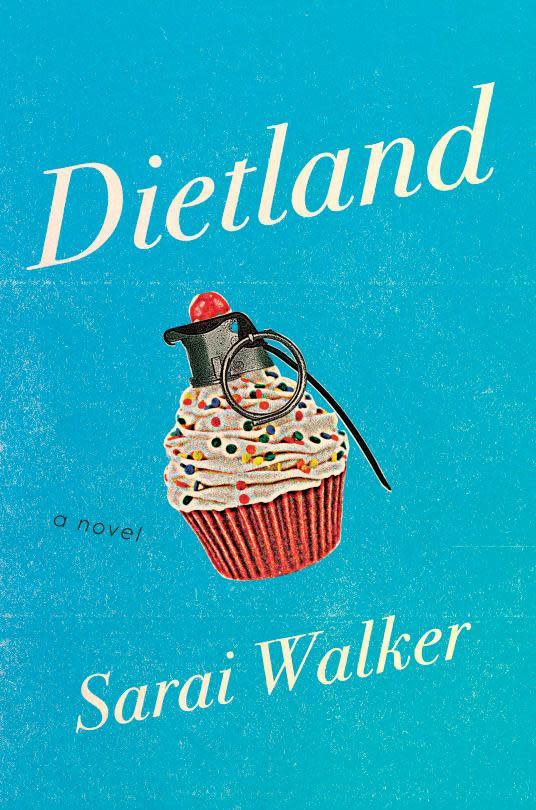Fight Club for Women: Why ‘Dietland’ is Not Another Chick Lit Novel

Sarai Walker’s debut novel, Dietland. (Photo: Houghton Mifflin Harcourt)
Sarai Walker was inspired to write her genre-defying first novel, Dietland, after she saw the movie Fight Club. “I came out thinking that I had to write the female version,” Walker told Yahoo Beauty. “I love the way it engages with political issues, its consciousness-raising, and its angry, defiant spirit. People are often surprised that I like Fight Club because they think it’s a sexist film, but what Fight Club is really about, at least for me, is the social construction of masculinity, of gender, which makes it fascinating from a feminist perspective.” The novel features a smart heroine, Plum Kettle, who toils at a teen magazine, waiting desperately to have weight loss surgery, a procedure she thinks will bring her the confidence and self-esteem she lacks.
Walker kept postponing Dietland because she felt that she needed more life experience and perspective before writing it. She started writing it in her mid-30s but didn’t finish until she was 40. The book actually had trouble finding an agent because it didn’t fit into any one category. It was a book written for women, but it didn’t fall into the structure of chick lit, and it ultimately is about fat acceptance, not a concept that has gone mainstream. “I don’t like to use euphemisms like overweight or obese, because overweight means there’s a ‘normal’ weight, while obese is a clinical term that defines fatness as a medical disease,” Walker says. “I’m fat myself, and I think it’s better to reclaim that word. There are so many great people writing about these issues that you see on social media and blogs. But a novel with a fat-positive character is still very rare.”
Walker’s experience working for teen magazines, writing for women’s magazines, and working as an editor for the groundbreaking women’s health book Our Bodies, Ourselves inspired much of the novel. One of the characters, Julia, is a beauty editor at a glossy media company located in Times Square that seems very similar to Condé Nast, but Julia also has a PhD in Women’s Studies. “There’s a lot of smart women working in magazines,” Walker says. “While I was working in the industry, I knew a woman with a PhD in English from Yale at a women’s magazine. It’s not that improbable at all.” In the book, Plum writes for a teen magazine — the job a million girls would kill for — but she always feels like an outsider because of her weight. “Plum thought it was like a high school clique. I definitely had that feeling that I was the only one who was fat. Maybe things have changed now, at the time, I wasn’t into fat acceptance, so I internalized all the shame,” Walker says.

Dietland author Sarai Walker. (Photo: Marion Ettlinger)
Walker incorporates some inspiring feminist theory into the book, which is not surprising considering she has a MFA from Bennington College and a PhD in English from the University of London. In Dietland, Kettle joins an underground feminist guerrilla collective based in Manhattan, founded by the daughter of a diet plan guru who wants to pay reparations for her family’s sins. The tactics employed by the group are extreme and uncomfortable, but they start to make you realize that they’re uncomfortable because we’re forced to confront misogyny and patriarchy head-on. In one task assigned to Kettle, she has to go on a series of blind dates with seemingly “nice guys,” like an assistant professor of literature at NYU named Jack. “No offense or anything, but you’re not really my type. I’m attracted to a different sort of woman. It’s nothing against you personally or anything. I don’t like redheads either, not that you’re a redhead, but you know what I mean,” he told her in a faux-diplomatic manner, right before he called her a “fat b—-.” It’s dehumanizing, but Kettle learns to build her self worth and empowerment from these insulting incidents: the more others treat her less like a human being of worth, the more she learns to free herself from the way they make her feel bad.
In Unbearable Weight: Feminism, Western Culture and the Body, feminist philosopher Susan Bordo wrote: “The representation of unrestrained appetite as inappropriate for women, the depiction of female eating as a private, transgressive act, make restriction and denial of hunger central features of the construction of femininity and set up the compensatory binge as a virtual inevitability. Such restrictions on appetite, moreover, are not merely about food intake. […] Denying oneself food becomes the central micro-practice in the education of feminine self-restraint and containment of impulse.” Walker hides these riveting and complex ideas within her text by borrowing the accessible language of “chick lit” to bring feminism mainstream.
Kettle is not your typical “chick lit” protagonist and Dietland is not your typical “chick lit” book, though the cover art is cute and enticing. Most contemporary female protagonists are either lithe and beautiful or become lithe and beautiful by the end of the book. Kettle gains confidence and friendship without losing weight she learns about body confidence and positivity through a guerilla feminist collective, and there is no romantic object of affection involved. Unlike other female characters in novels, Kettle doesn’t need a guy or a diet to make herself whole, and her story is way more interesting — and empowering — because of it.
Related:
Plus-Size Model Tess Holliday Encourages Women to #EffYourBeautyStandards